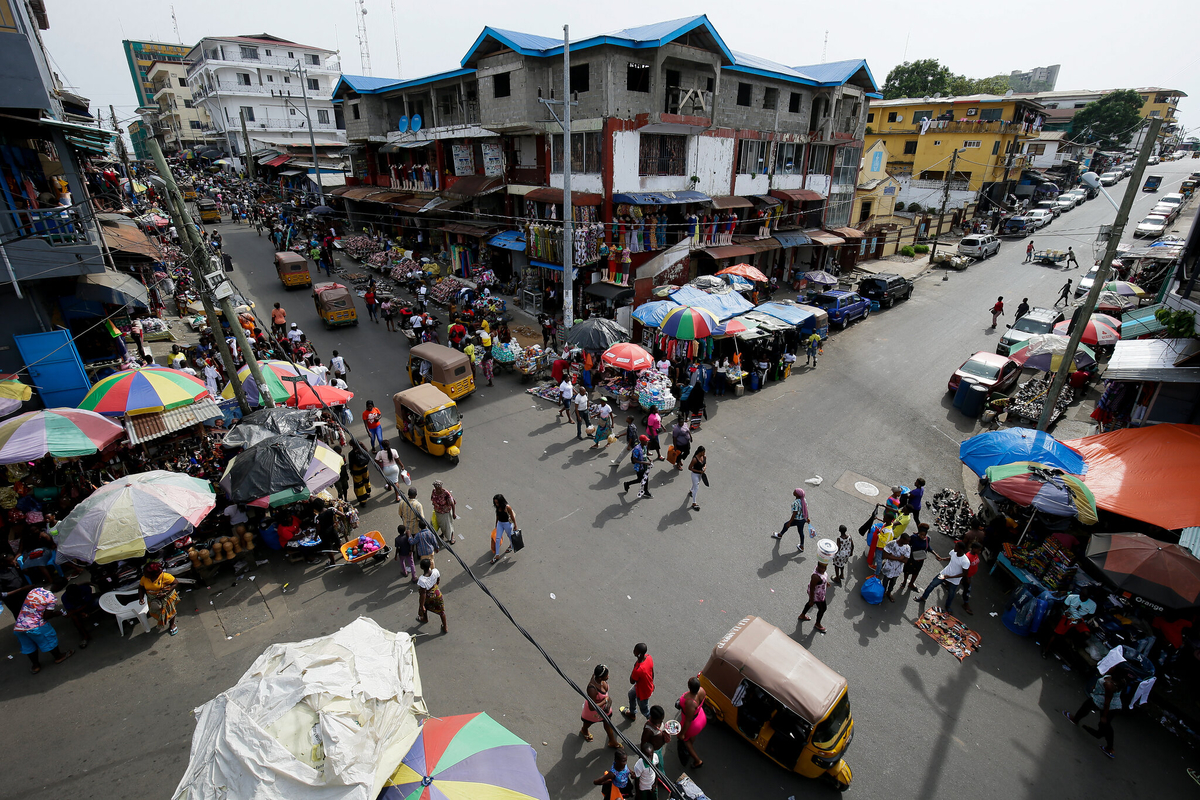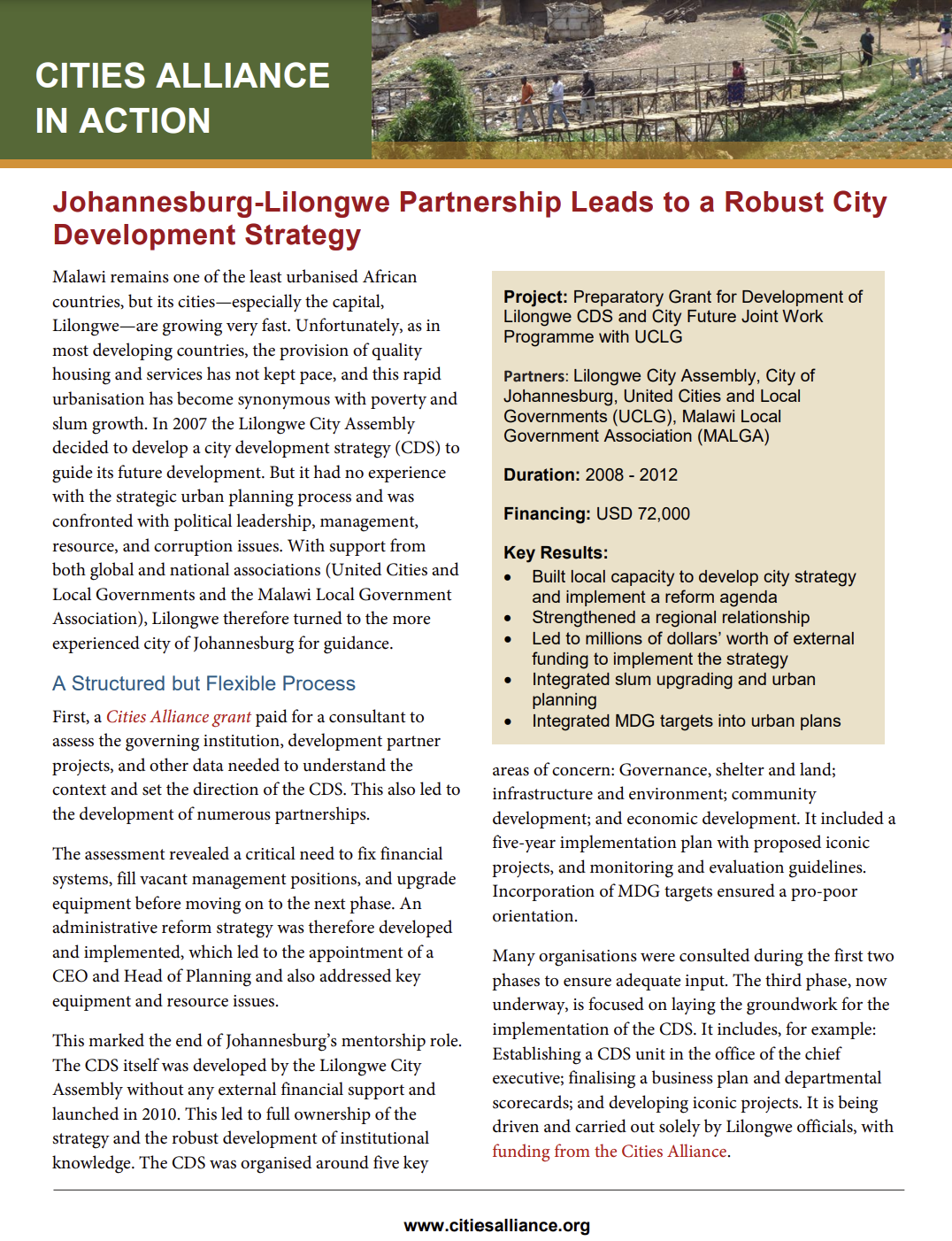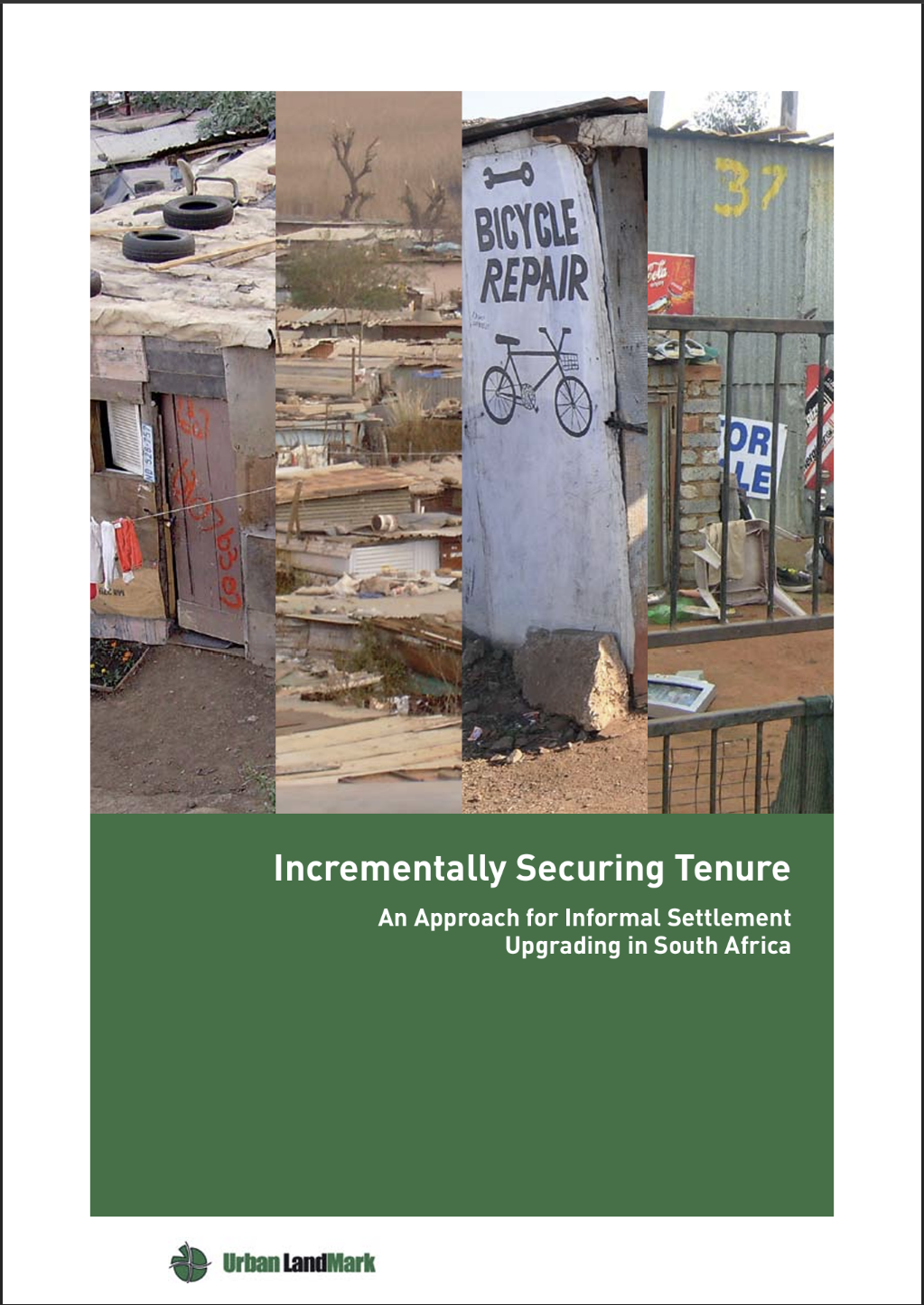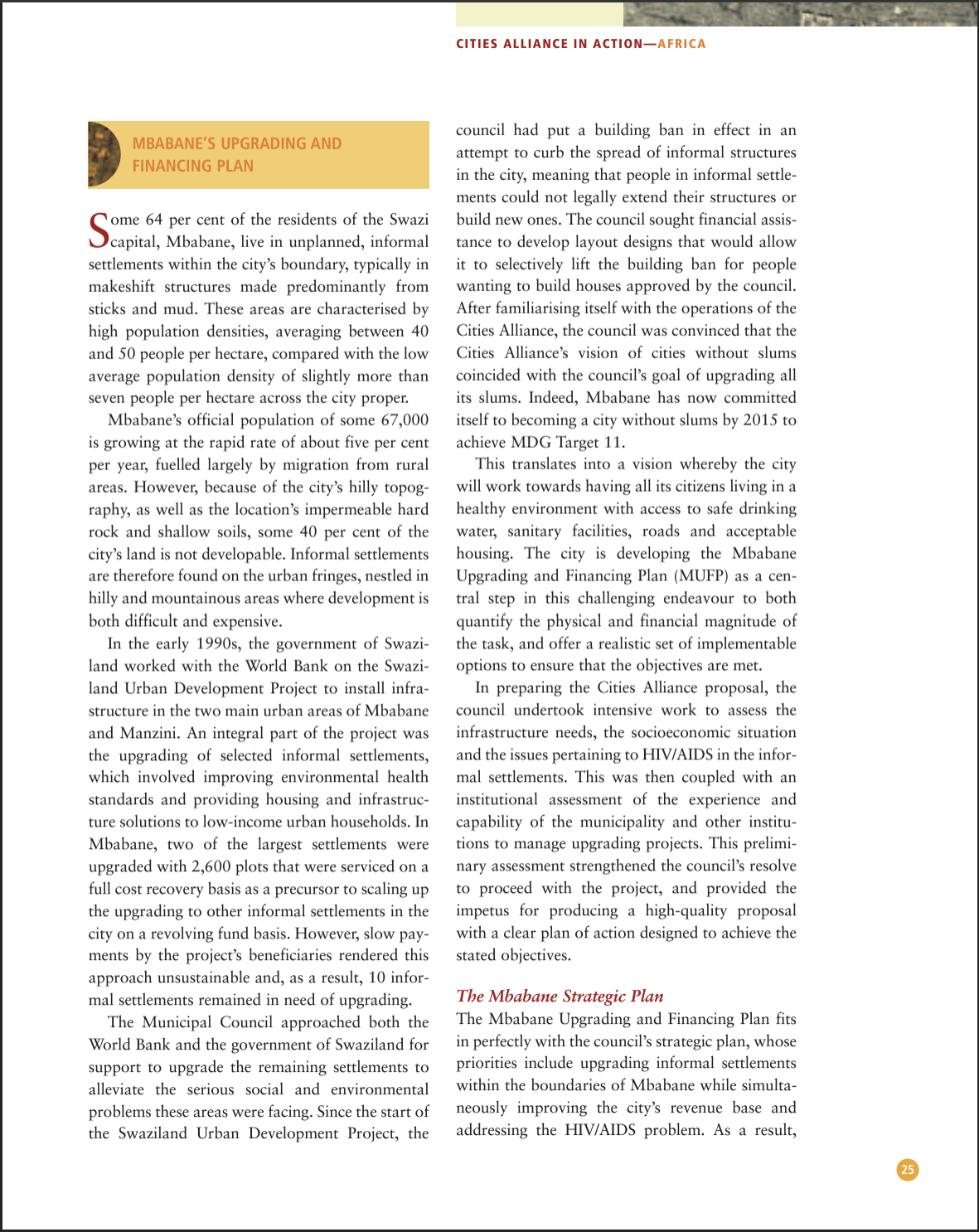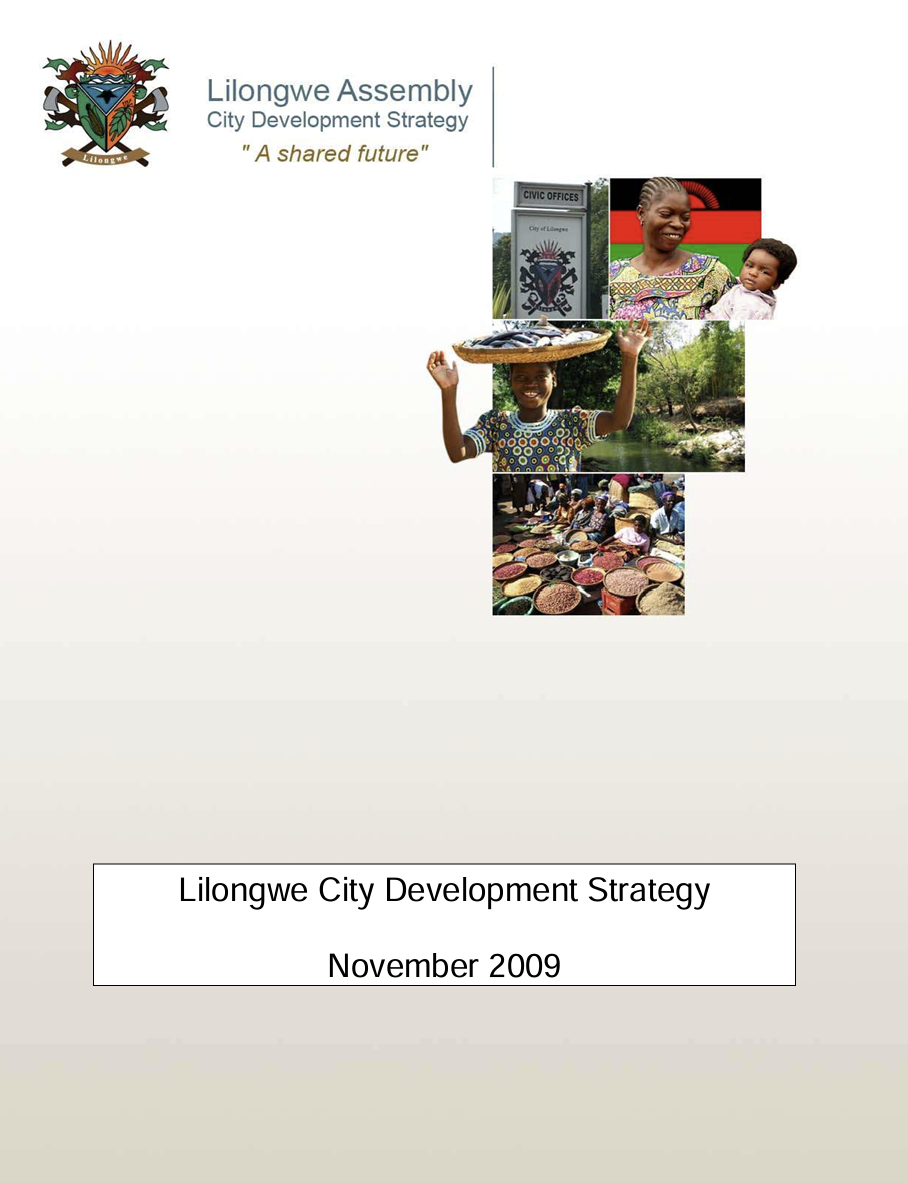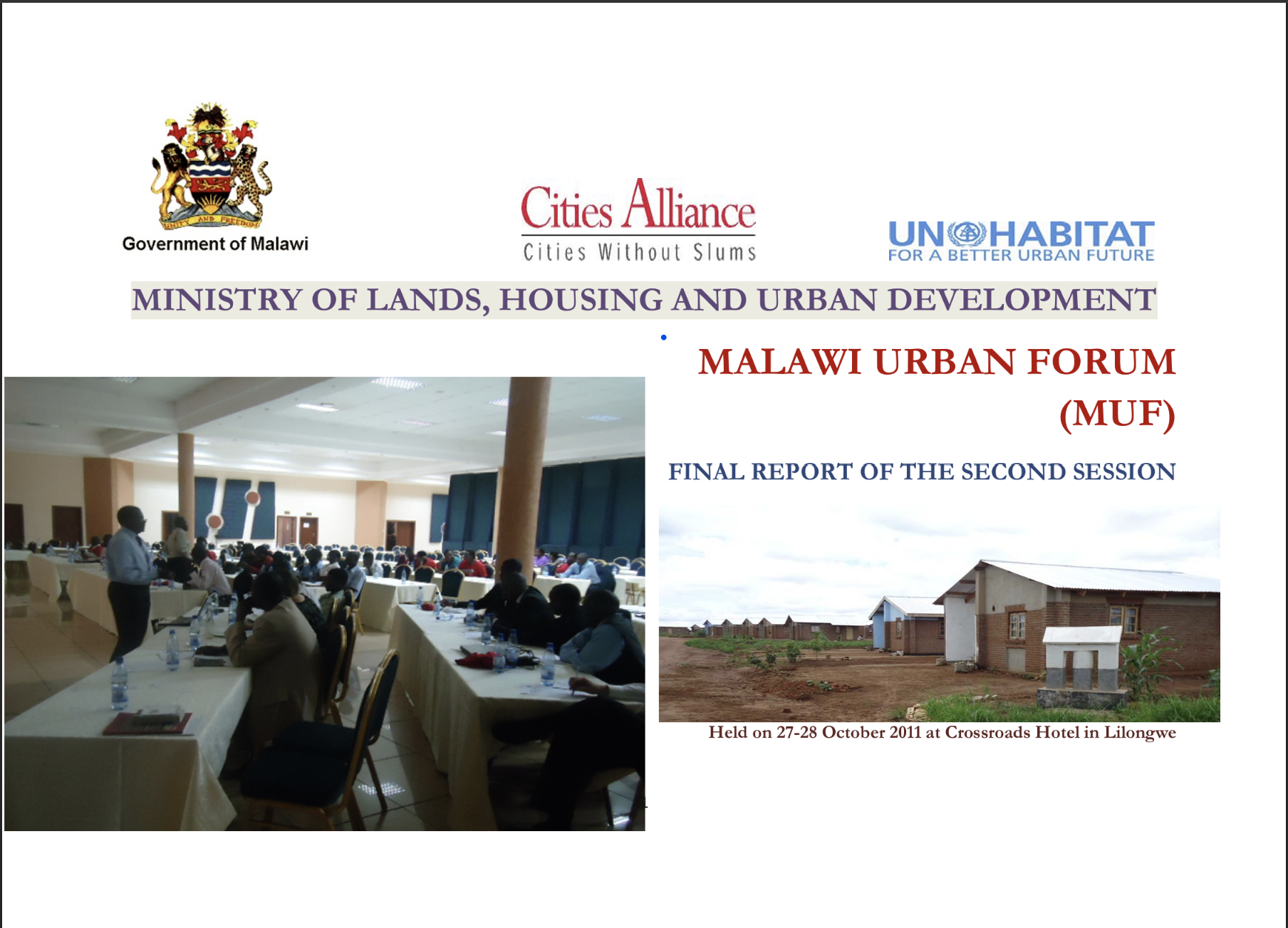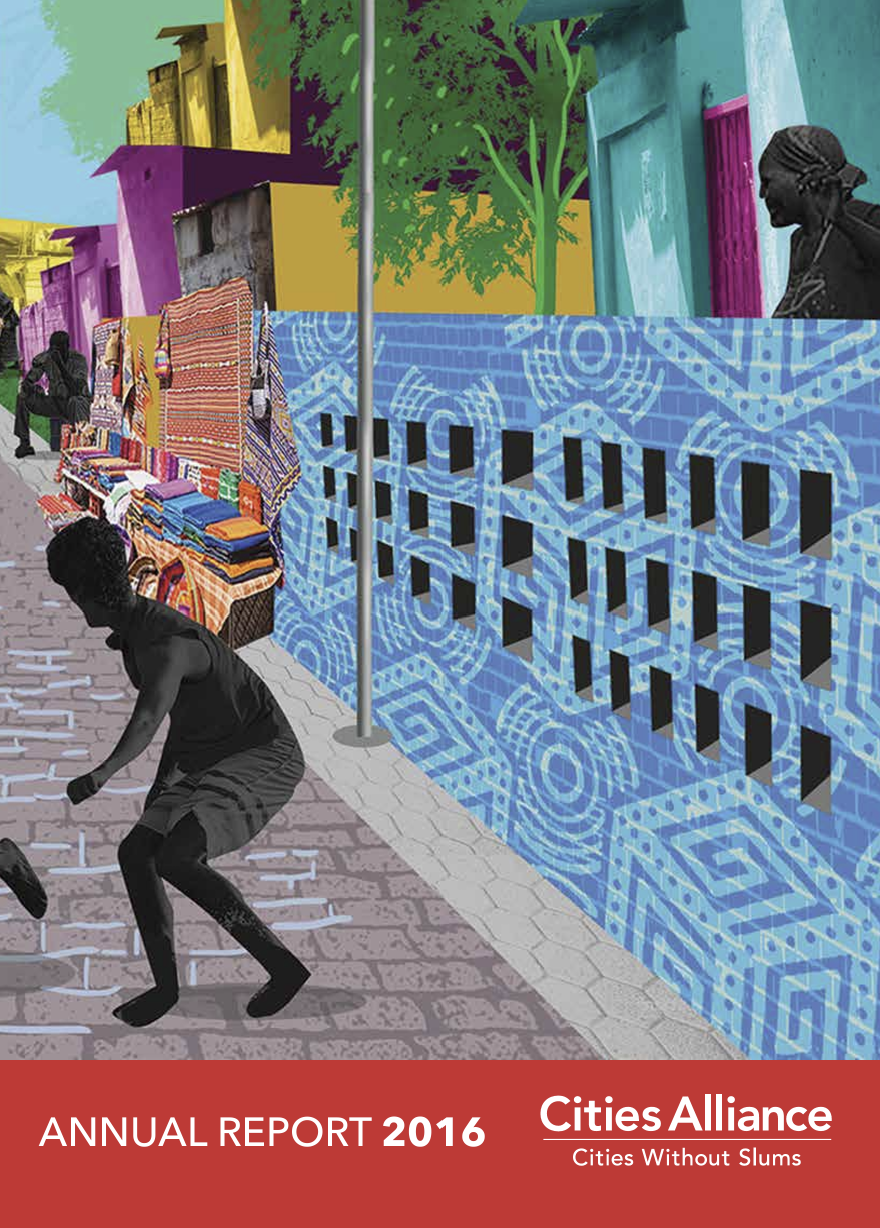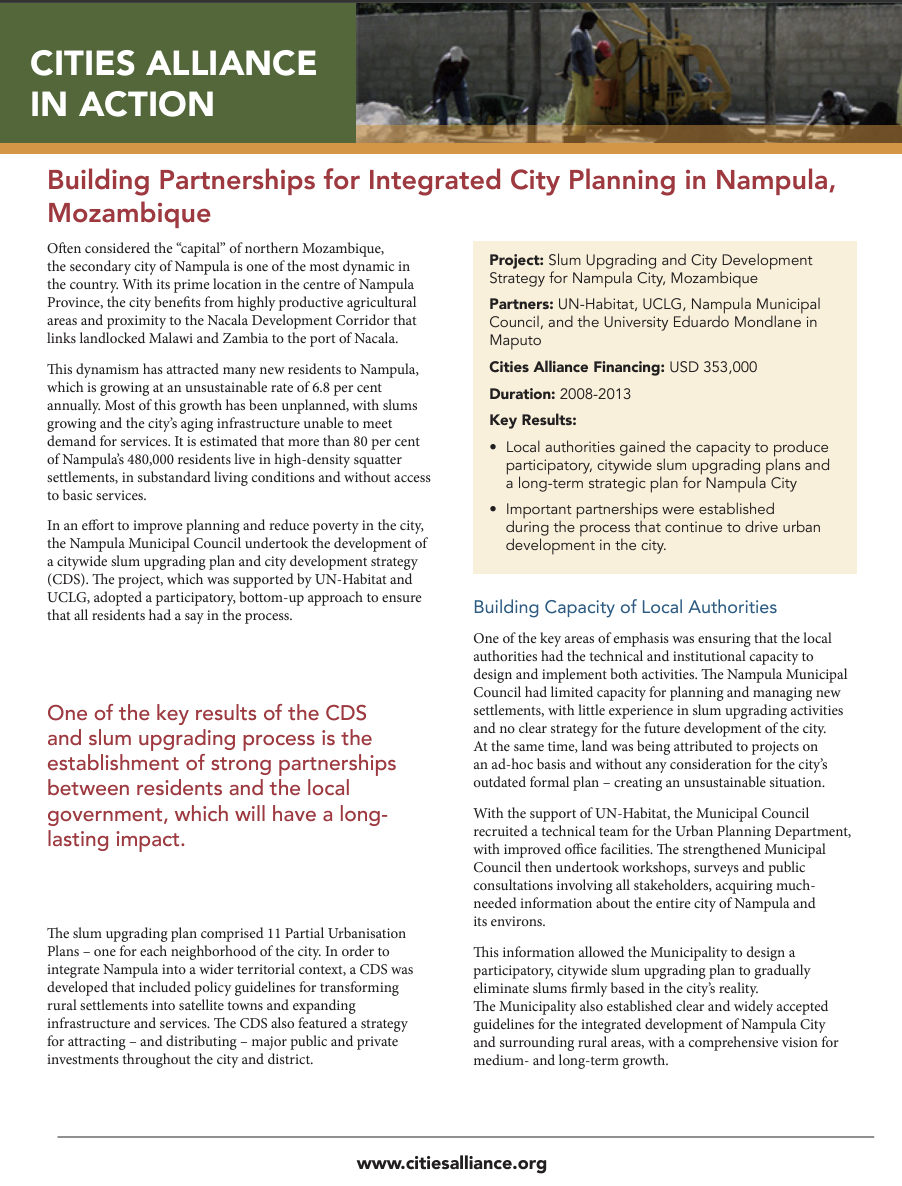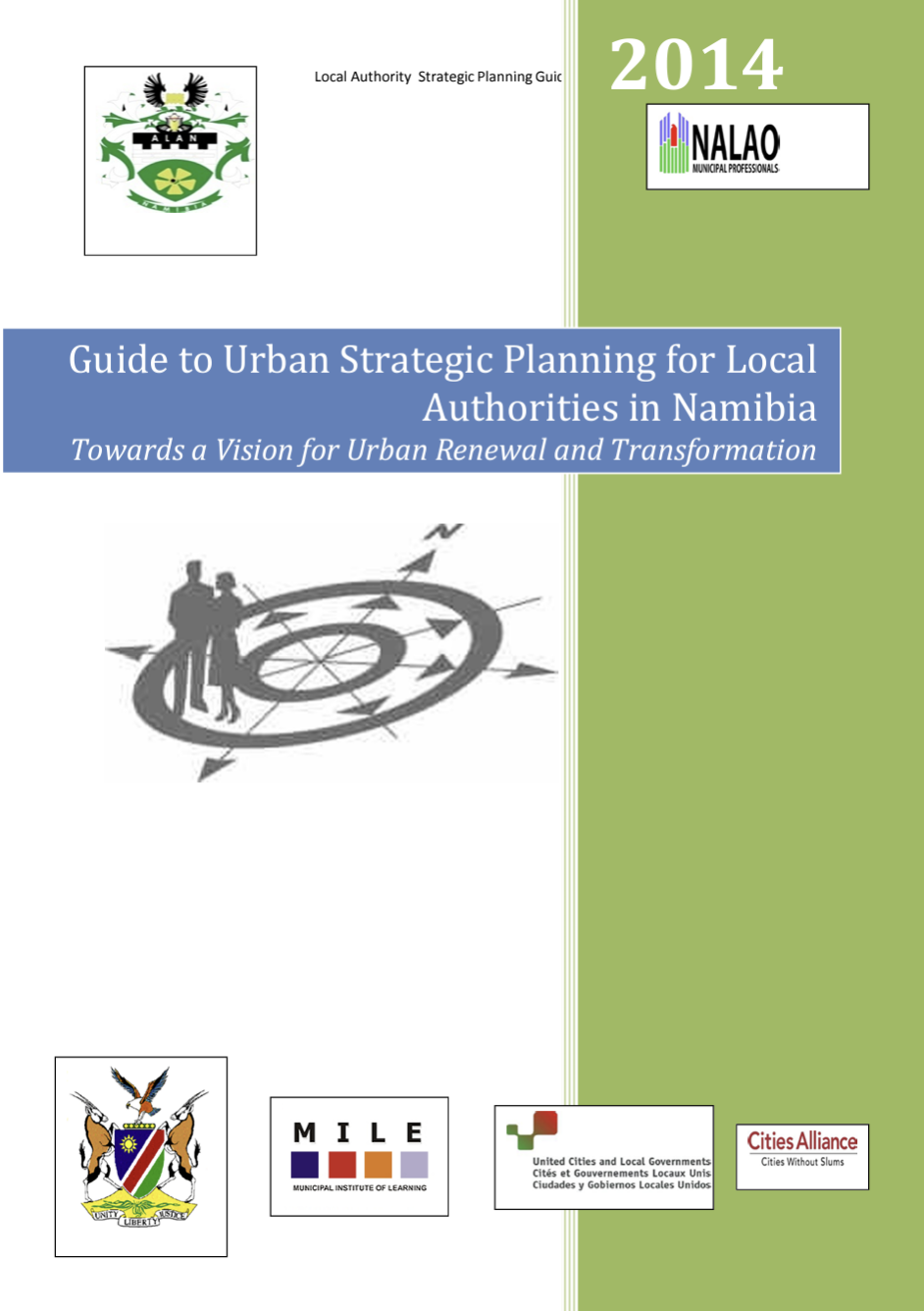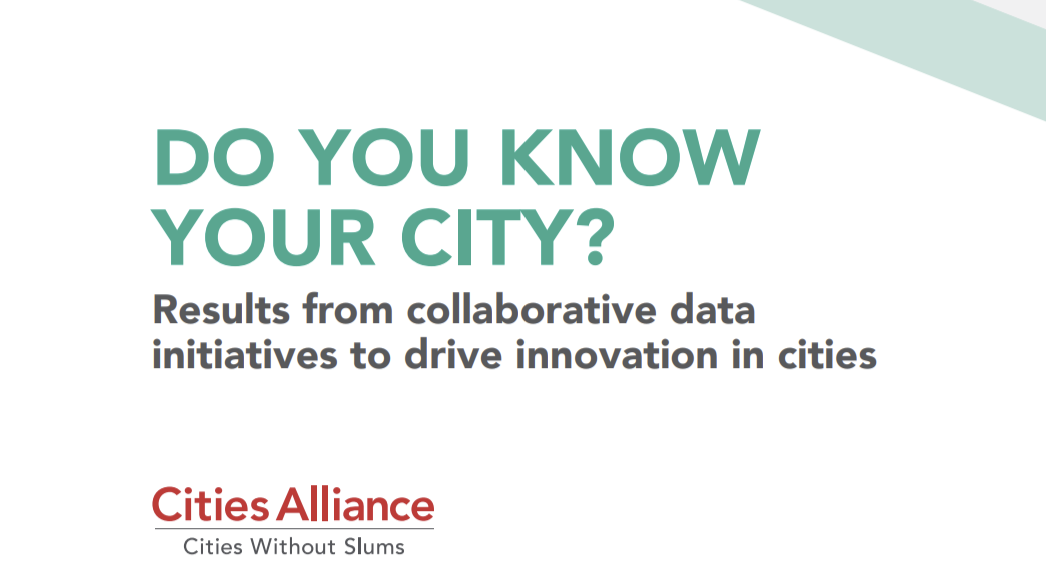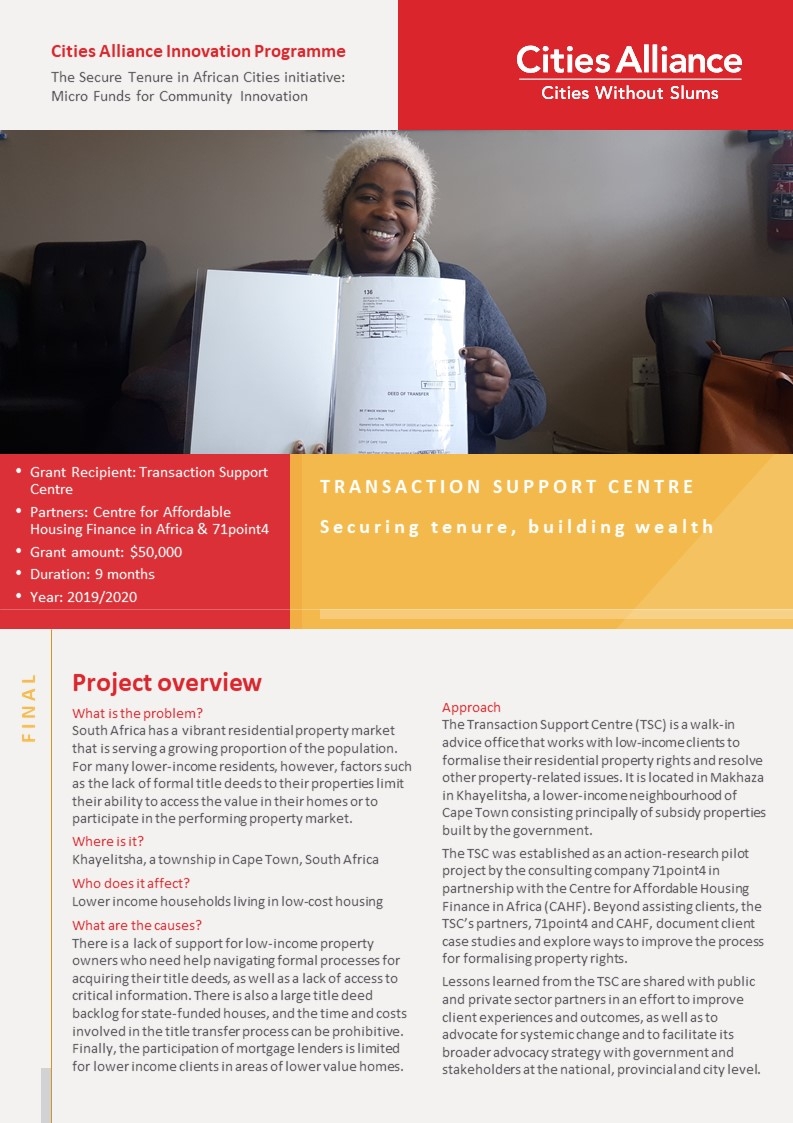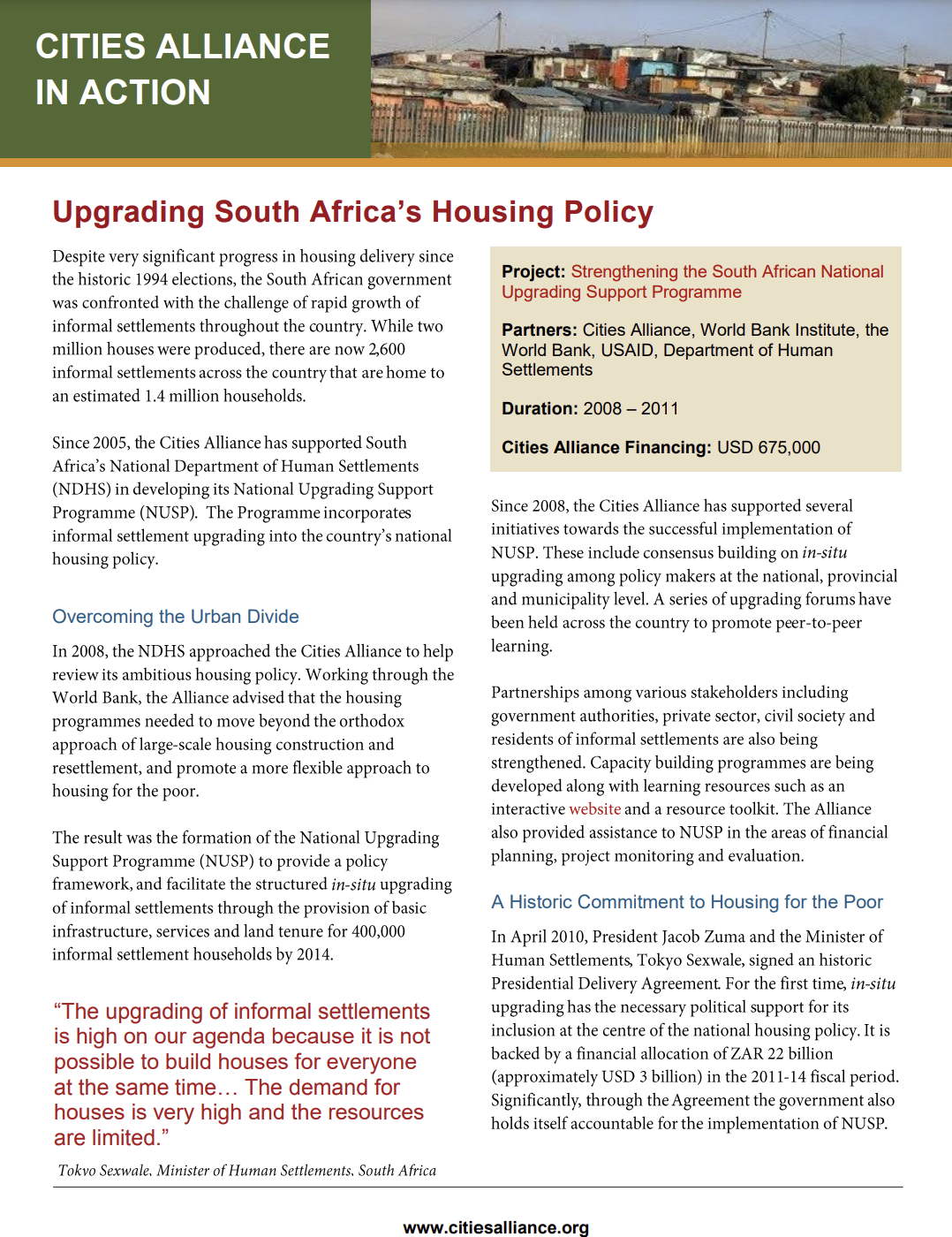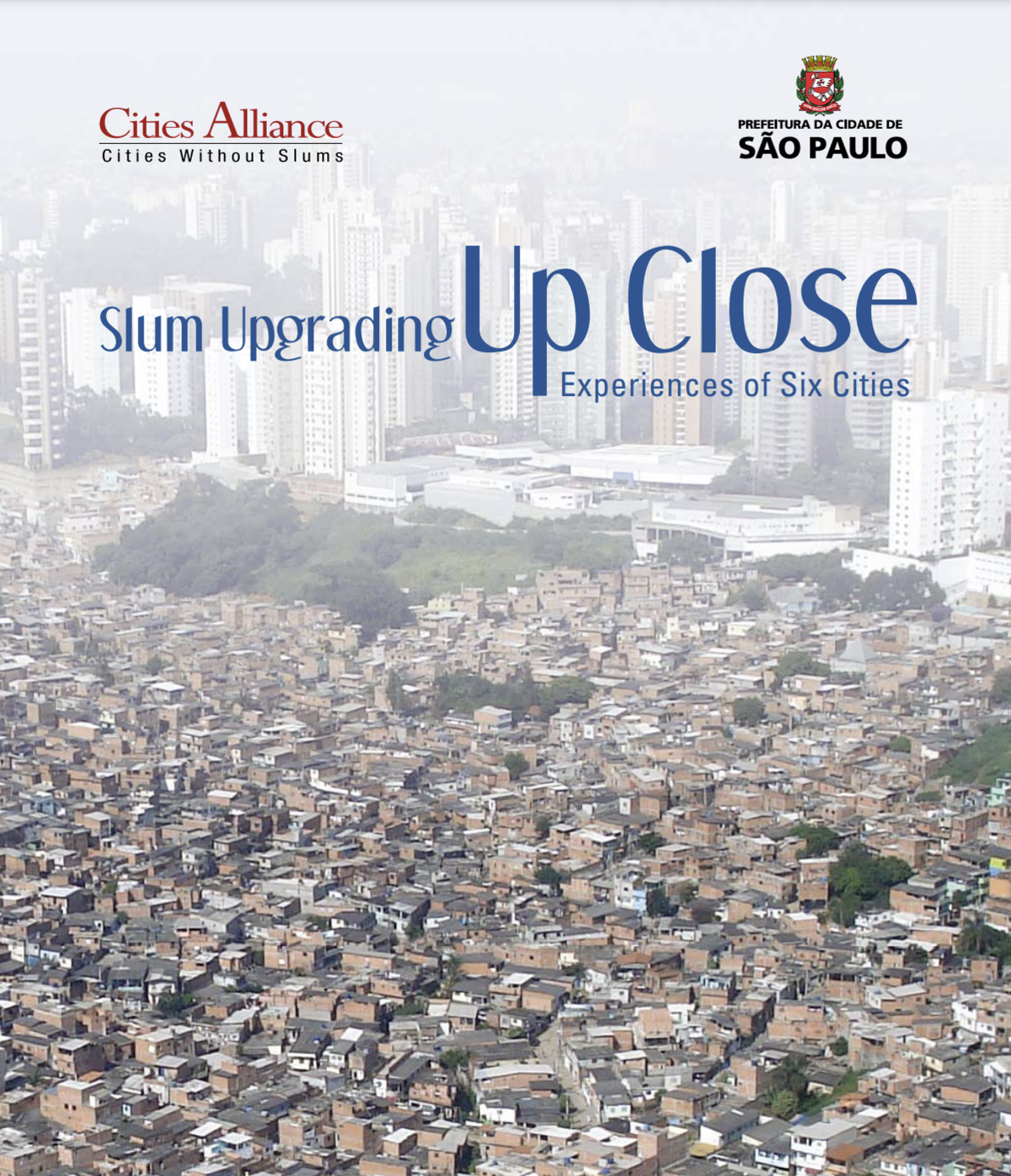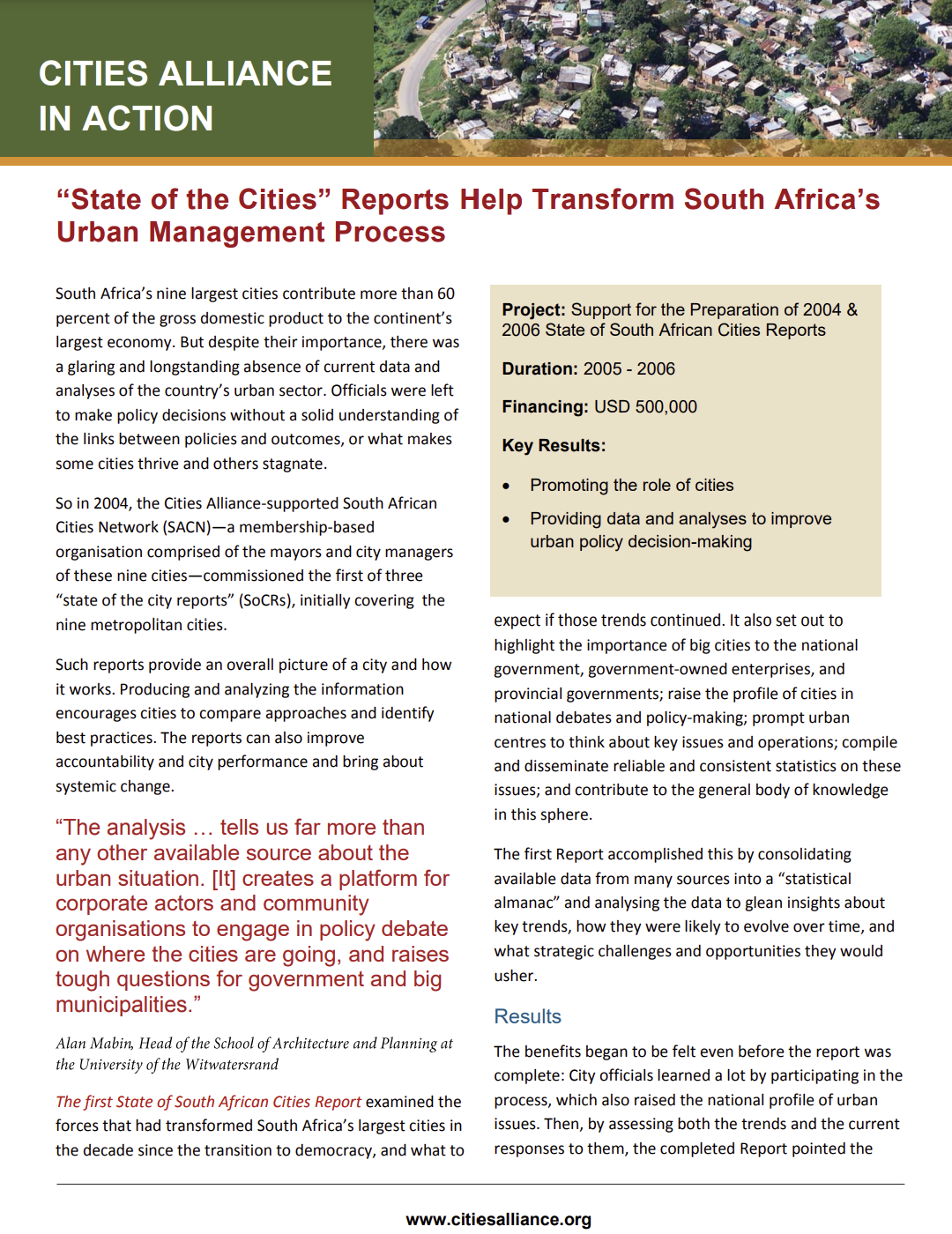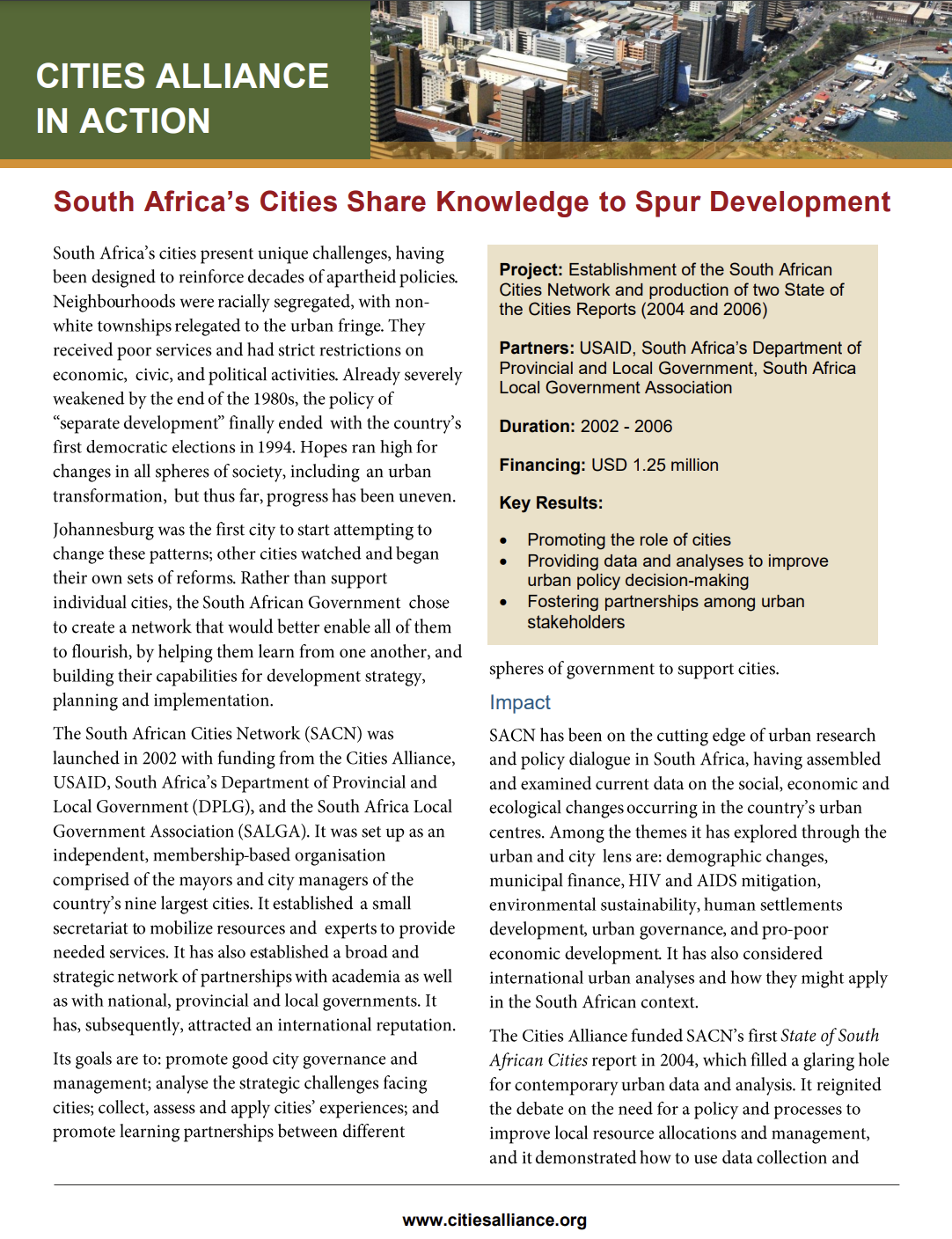Cities Alliance has been active in Southern Africa since 2000, supporting inclusive city development strategies, comprehensive slum upgrading programmes, national policies, and projects to increase tenure security in informal settlements.
A broad-based initiative is supporting communities in Botswana, Eswatini, Malawi, Namibia, South Africa, Tanzania, Uganda, Zambia, and Zimbabwe to build resilience following the COVID-19 pandemic.
Through the Mozambique Country Programme, the city of Maputo was able to draw on over ten years of Cities Alliance experience with integrated and participatory slum upgrading developed in Brazil and adapt it to the Mozambican context.
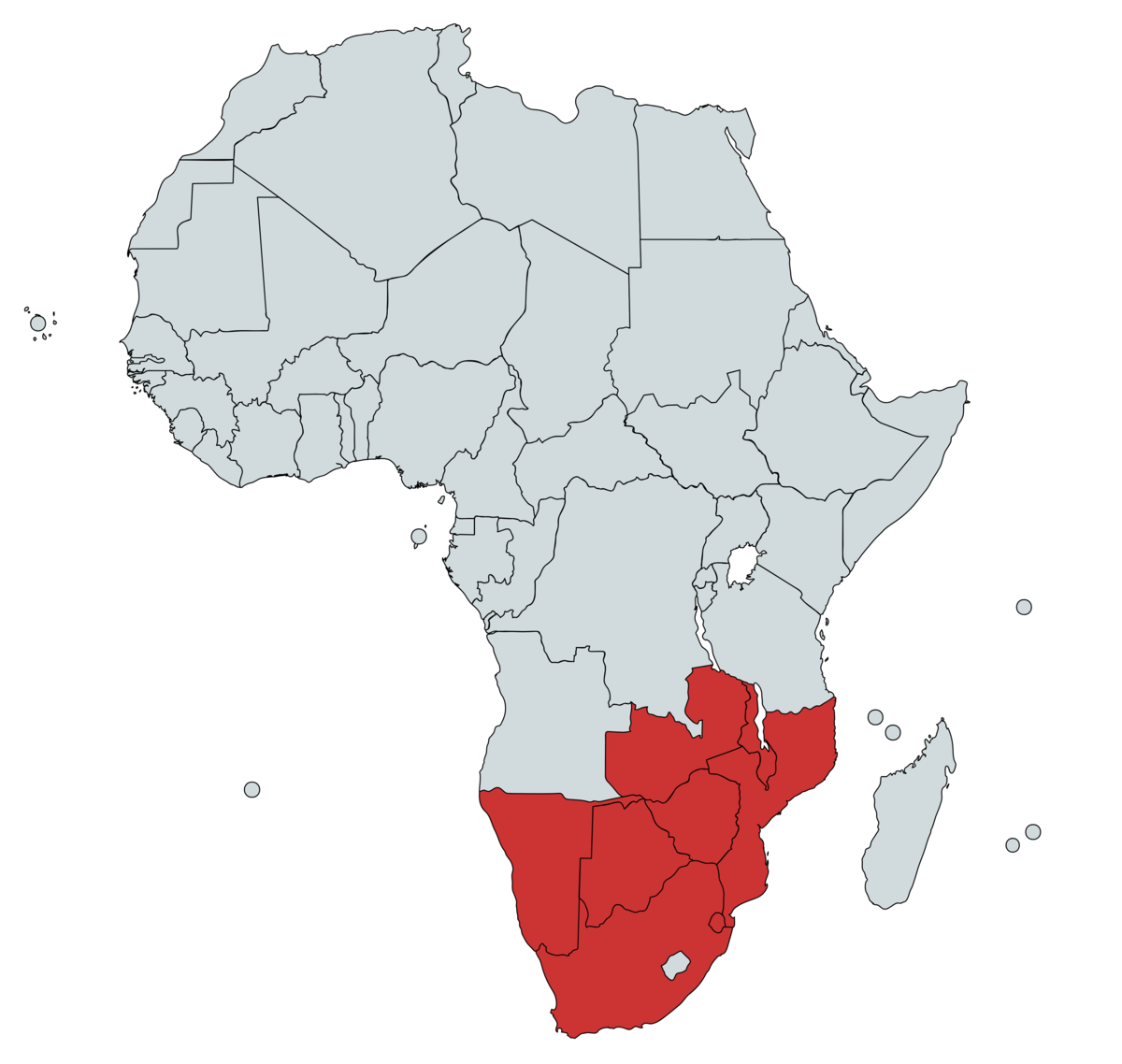
In 2007 the Lilongwe City Assembly decided to develop a city development strategy (CDS) to guide its future development. But it had no experience with the strategic urban planning process and was confronted with political leadership, management, resource, and corruption issues.
With support from both global and national associations (United Cities and Local Governments and the Malawi Local Government Association), Lilongwe turned to the more experienced city of Johannesburg for guidance.
A Cities Alliance grant (2008-2012) financed an assessment of the governing institution, development partner projects, and other data needed to understand the context and set the direction of the CDS. This also led to the development of numerous partnerships.
The Johannesburg team offered targeted support and guidance to the Lilongwe City Council, ensuring that the programme had the right tools, involved critical stakeholders, remained on target, and used the best possible information.
The CDS itself was developed by the Lilongwe City Assembly without any external financial support and launched in 2010. This led to full ownership of the strategy and the robust development of institutional knowledge.
The CDS was organised around five key areas of concern: Governance, shelter and land; infrastructure and environment; community development; and economic development. It included a five-year implementation plan with proposed iconic projects, and monitoring and evaluation guidelines. Incorporation of MDG targets ensured a pro-poor orientation.
Cities Alliance also provided a platform for promoting the outcomes of the Lilongwe CDS. The Johannesburg-Lilongwe partnership was presented at a Cities Alliance forum in India, which resulted in funding from the Bill & Melinda Gates Foundation for slum upgrading in Lilongwe. In November 2012, the partnership was awarded the Guangzhou Award on Urban Innovation.
Implemented by Urban LandMark, the Tenure Security Facility Southern Africa initiative supported work on developing mechanisms to incrementally increase tenure security for households, including market studies and national tenure dialogues. The work has made a significant impact on changing the profile of the need for incremental tenure in the slum upgrading process and has influenced thinking around how it should be done.
Lessons learned informed the development of a practical regional booklet, Incrementally Securing Tenure: Promising Practices in Informal Settlement Upgrading in Southern Africa, which includes both legal and administrative mechanisms for incrementally securing tenure.
It was sponsored by Shack/Slum Dwellers International and the South Africa Department of Human Settlements and funded through the Cities Alliance Innovation Programme's 2011 Open Call for Proposals.
Eswatini
Cities Alliance has supported the various stages of a comprehensive, citywide urban upgrading initiative in Mbabane, from preparation to upscaling and implementation.
The first project (2003-2004) was a preparatory grant that established a framework and action plan for the Mbabane Comprehensive Slum Upgrading and Finance Programme.
The next project (2004-2008) supported the Municipal Council of Mbabane with scaling up and developing a comprehensive plan for upgrading the informal settlements in Mbabane based on high-quality data from socio-economic and physical surveys. The plan also included the goals of increasing access to urban services and infrastructure, improving security of tenure for households in the settlements, and strengthening participatory government.
A third project (2009-2012) supported the implementation of Mbabane's comprehensive urban upgrading programme. It enabled the Municipal Council of Mbabane to initiate formal surveys of the plots in Mbabane's eight informal settlements. Completion of formal land surveys allowed the Municipal Council to award secure tenure to the residents of these communities, followed by incremental upgrading of all communities as resources became available, including through the World Bank's Swaziland Local Government Project (SLGP).
This project (2008-2010) supported the key government departments in defining a system of local government that fully incorporated the city development strategy (CDS) principles of productivity, inclusion, sustainability, and good governance.
Together, the team of governance, finance, GIS, infrastructure, economists and demographic experts undertook a range of activities including extensive consultations with the national government, data collection, and analysis.
They produced a number of outputs to shape the design of a new local government system, including jurisdictions and the associated fiscal framework, and improve municipal service provision, sustainable investment and land use planning.
The team also prepared a consolidated report and spatial viewer to reflect alternative local government models.
The outputs included:
- Capturing spatial data for the entire country, including aerial photographs, geographic distribution of economic activity, existing and proposed functional boundaries, infrastructure networks, and current and projected demographic profiles.
- A report on demographic and urban issues based on spatial data collected.
- An updated review of existing infrastructure (roads, water and sanitation, electricity and telecommunications) and planned expansions to the existing networks to inform the design of alternative systems of sustainable local government.
- An updated review of the performance of the local economy over the past five years with considerations for a framework and mechanisms necessary to stimulate growth.
Malawi
Lilongwe's city development strategy (CDS) process began in 2007 through the City Future programme, which was a partnership between United Cities Local Governments (UCLG) and Cities Alliance. Johannesburg, South Africa -- which had sigificant experience with CDS -- agreed to mentor Lilongwe. The mentorship was critical to developing a robust CDS for Lilongwe.
Cities Alliance provided a grant for the preparatory phase (2008-2010), which assisted with the provision of some basic information and data toward understanding and categorising the critical issues. The focus was on an assessment of the information environment, an institutional audit/scan, an audit of development partner-funded projects and their potential contribution to the CDS process, as well as a stakeholder analysis.
During the second phase, the Lilongwe City Council developed its CDS through a participatory process based on the information compiled during the preparatory phase. The policy context in Malawi, the Millennium Development Goals, and key challenges and opportunities were extracted to guide the preparation of the long-term vision, goals, and objectives for the city. A common set of building blocks was used to reach agreement on a set of goals, objectives, and interventions.
Phase 3 (2012-2014) focused on implementing the CDS and financing its priorities. It supported the establishment of a unit to coordinate and monitor implementation of the strategy, formulation of a business plan for the sanitation and hygiene sectors, feasibility studies, community forums, and a communication strategy for the Lilongwe City Council.
The CDS had considerable impacts for Lilongwe. It enhanced the capacity of the Lilongwe City Council for participatory urban planning and implementation as well as raising the profile of the CDS nationally and internationally. Lilongwe local authorities were invited on several exposure visits to share the city's CDS experience. In 2012, the Lilongwe-Johannesburg partnership was recognised with the International Guangzhou Award for Urban Innovation.
This project (2011-2013) aimed to improve the lives of people living and working in the slums and informal settlements in urban areas in Blantyre, Lilongwe, Mzuzu, and Zomba as well as building capacity of government local authorities and communities to effectively address poor living conditions in the slums and strategies to reduce further growth.
The project's main results were:
1. Supporting the second session of the Malawi Urban Forum, which was instrumental in bringing urbanisation and urban poverty issues onto the national debate as evidenced through increased coverage of these issues in electronic and print media.
2. Developing Malawi's first National Urban Policy, beginning with a framework, training for government staff, and a situation analysis study. Crucially, it was a participatory process, involving central and local governments, development partners, civil society and urban communities all working together to help Malawi establish a sustainable urban system.
3. Conducting a capacity needs assessment for slum upgrading at the national, municipal, and community levels that was used by the government and municipalities to design capacity building interventions at the respective levels.
4. Facilitating a partnership between the Ministry of Lands, Housing and Urban Development and the Centre for Community Organisation and Development (CCODE)—an affiliate of Shack/Slum Dwellers International (SDI)—to design and roll out pilot capacity building activities. The outcomes of this pilot will inform a national capacity building strategy.
Mozambique
This Country Programme (2012-2016) was developed to contribute to building the capacity of local communities, local government and national government. Another objective was to promote new approaches to the urban agenda; in Mozambique, the developmental paradigm is largely rural, and the national government has not adequately prioritised urban planning and governance.
The Country Programme was led by GIZ, with support and active collaboration from implementing partners including the World Bank, UN-Habitat, and the cities of Maputo, Tete, Nampula, and Nacalaa-Velha. It was financed by the Bill & Melinda Gates Foundation.
Upgrading of Chamanculo-C
One of the key projects for the Mozambique Country Programme was upgrading the Chamanculo-C neighbourhood of Maputo. The initiative was a significant activity for Cities Alliance. It piloted an integrated, participatory slum upgrading approach developed in Bahia, Brazil with the support of the Italian Government, World Bank, AVSI, and Cities Alliance, and adapted the approach to the Mozambican context. It was implemented by the Municipality of Maputo.
The Chamanculo-C activity successfully leveraged funding for additional projects. for every dollar invested in Chamanculo-C, US$2.2 was raised as leverage.
Strengthening local capacity with the Urban Planning Support Unit
The Country Programme aimed to strengthen the planning capacities of local government officials and technicians of Nampula, Nacala and Tete municipalities to promote effective planning of the Nampula-Nacala-Tete urban corridor. This included an Urban Planning Support Unit to provide training and support for local governments.
National Institute of Physical and Environmental Planning
A new curriculum and course framework was developed for the Medium Level Institute for Physical and Environmental Planning (IMPFA), making the training of municipal planning technicians much easier, especially for municipal planners working in secondary cities.
Mozambique’s first National Urban Forum and second Urban Festival
In 2016, Mozambique held its first National Urban Forum in Maputo. Championed by the First Lady of Mozambique Ms. Isaura Nyusi, the Forum was an effective platform for participatory urban policy dialogue and is expected to continue. Mozambique has continued to hold additional National Urban Forums.
Following the success of the National Urban Forum, the second Urban Festival was held in Maputo in 2016 through a Cities Alliance grant to GIZ. The event focused on the role and potential of urban citizenry.
To improve planning and reduce poverty in the city, the Nampula Municipal Council undertook the development of a citywide slum upgrading plan and city development strategy (CDS) from 2008-2013.
The project, which was supported by UN-Habitat and UCLG, adopted a participatory, bottom-up approach to ensure that all residents had a say in the process.
The slum upgrading plan comprised 11 Partial Urbanisation Plans – one for each neighborhood of the city. To integrate Nampula into a wider territorial context, a CDS was developed that included policy guidelines for transforming rural settlements into satellite towns and expanding infrastructure and services. The CDS also featured a strategy for attracting – and distributing – major public and private investments throughout the city and district.
By far the most important result was the facilitation of an ongoing, constructive dialogue among the municipality, district, and provincial authorities to establish an environment that reinforces urban-rural linkages in the medium to long term. This process is vital to the economy and sustainable development of the city. It also fostered strong relationships between residents and the local government, with strong ownership of the urban planning process on all sides.
This two-phase partnership between the Cities Alliance and United Cities and Local Governments (UCLG) furthered the agenda of urban strategic planning. It also motivated cities in Mozambique to advance their planning agendas, primarily through the National Association of Municipalities of Mozambique (ANAMM).
As a result, many Cities Alliance partners are now assisting local development processes in Mozambique, and the city of Maputo prioritised strategic city planning for the coming years. This served as a starting point for a State of Mozambican Cities Report and a city development strategy for Nampula.
During the second phase of the activity, Mozambican cities expressed their interest in participating in UCLG’s City Mentoring programme. UCLG has established a task force for mentoring in Mozambique, including two Brazilian cities (Porto Alegre and Belo Horizonte) and the City of Maputo (Mozambique).
This Cities Alliance-funded project (2005-2008) was conceived as an adjunct to the Maputo Municipal Development Programme funded by the World Bank. It supported the development of an incremental, integrated approach towards participatory upgrading in Chamanculo-C, one of Maputo’s many informal neighbourhoods.
The project had a significant catalytic impact. In 2007, discussions began on development cooperation between Brazil and Italy with third countries. These discussions resulted in the Italian-Brazilian Triangular Cooperation Programme, with upgrading of ‘degraded’ city neighbourhoods as a priority theme.
This programme enabled Maputo to draw on over ten years of experience with integrated and participatory slum upgrading developed in Bahia, Brazil with the support of the Italian government and the Cities Alliance. The upgrading of Chamanculo-C subsequently became a foundation of the Cities Alliance Country Programme in Mozambique.
Built on a previous Cities Alliance activity in the city, this project supported the Quelimane Municipal Council in implementing a participatory approach for upgrading in peri-urban areas. It focused on identifying and implementing innovative tools and solutions for improving water and sanitation conditions in slum areas of Quelimane City, targeting vulnerable groups including women and children.
In addition to the Cities Alliance, a number of partners also supported this activity – UNHABITAT, the Danish International Development Agency (DANIDA), the Mozambican Government’s Water Supply Investment and Assets Fund (FIPAG), UNICEF, and WaterAid, a British NGO. As a result of the activity, service delivery was improved, primarily through decentralised urban management based on sharing of responsibilities with the community.
In partnership with UN-Habitat and UNDP, the Cities Alliance supported four City Councils in Mozambique – Maputo, Chokwe, Tete, and Quelimane – to reduce the vulnerability of communities living in flood-prone areas.
Each city devised a flood mitigation strategy that emphasised preparedness as part of a broader settlement upgrading approach. Based on their experience, the cities subsequently made recommendations for a national disaster management framework under discussion by the government.
The activity was instrumental in convincing both national and local authorities of the feasibility of adopting new thinking in response to the threat of floods and, most critically, in moving away from previous policies that were based on resettlement as the first response.
Another key result was that Mozambican cities and national authorities developed an initial set of operational principles on urban upgrading adapted to the flood-prone areas of the country.
Namibia
Between 2007 and 2014, Cities Alliance supported a city development strategy (CDS) process in Namibia.
An initial grant supported a preparatory study that defined the components and steps needed for a CDS. The preparatory study served as an opportunity to remediate bottlenecks in local planning activities related to Namibia’s ongoing decentralisation process.
The consultative process leading up to the development of the full CDS proposal established and strengthened relationships across different stakeholder groups and strengthened the capacity of the Association of Local Authorities Namibia (ALAN). It also created awareness of the need for strategic urban planning and the role of local government in economic development.
A second grant (2011-2014) funded a pilot for the CDS process in five cities: Otjiwarongo, Omaruru, Karibib, Usakos, and Maltahöhe. These five local authorities worked in close cooperation with ALAN and the Ministry of Regional, Local Government, Housing, and Rural Development to execute the CDS process.
The findings of the pilot were distilled into a guide for urban strategic planning for all local authorities in Namibia.
The project also featured a city-to-city mentorship component with the eThekwini Municipal Institute of Learning (MILE) in South Africa. This partnership was a direct result of Cities Alliance's Joint Work Programme with United and Cities Local Governments (UCLG) to strengthen strategic urban planning.
The South Africa-Namibia mentorship programme inspired Swakopmund Municipality to establish a structured platform to provide support to the local government sector in Namibia, leading to the establishment of SMILE (Swakopmund Institute of Learning and Exchange) along similar principles as MILE.
Cities Alliance funded the Creating Momentum for Change through Innovative Information Generation and Engagement at the City Level in Africa project through the Innovation Programme's 2014 Call for Proposals on the theme Know Your City.
A partnership between Shack/ Slum Dwellers International and the Association of African Planning Schools (AAPS), the 2017 project sought to build partnerships between slum dwellers, local planning schools, and the municipality in secondary cities in Namibia, Kenya, Uganda and Zambia.
It developed partnerships primarily through “learning studios” for planning students, who work together with communities to collect data and identify urban development priorities. Results from the different communities are compiled in city workshops together with municipalities so that the community engagement can move from data gathering to planning interventions.
Through the project, the different communities gained valuable IT, community organisation, and mapping skills and a better understanding of the importance of advocating for their rights. The next generation of urban planners is learning “hands-on” the concept of promoting inclusive cities. Authorities, in turn, are showing greater understanding and appreciation for participatory urban planning.
In Namibia, the secondary cities selected were Gobabis, Helao Nafidi, and Karibib. Specific results include:
1. The government allocated NAD8 million for the upgrading of the Gobabis informal settlement. The funds were allocated based on the outcome of the studio work. The allocation assisted 1,050 households to obtain water and sanitation.
2. The process of communities collecting information and using it as a platform to engage their local authorities is now included in the upgrading strategies followed by the three cities.
3. Links were strengthened with the Association of Local Authorities in Namibia (ALAN) and the Namibia Association of Local Authority Official (NALAO). The lessons learned were shared by various local authorities and the qualified town planning and land administration students are applying what they learned in their cities.
4. The settlements involved in the project were part of ongoing upgrading projects that continued for three years, until the households obtained security of tenure.
5. Some of the improvements in the planning studio curricula are evidenced by the accommodation of participatory planning studios in planning courses, such as the Namibia University of Technology’s Bachelor of Town and Regional Planning programme.
South Africa
The Cities Alliance Innovation Programme supported this project in 2019 to help low-income residents in the Cape Town, South Africa neighbourhood of Makhaza navigate the complex process of obtaining title deeds for their properties.
South Africa has delivered some 3.5 million subsidised houses since 1994. While many people’s shelter needs have been met through this intervention, the security of their tenure remains compromised due to inefficiencies in the administrative and policy framework governing the market. For instance, in some cases, title deeds have not yet been transferred or households have traded their homes informally.
The Transaction Support Centre (TSC) is an action-learning advice centre in a low-income township of Cape Town that engages at the community level to help households undertake formal residential property transactions in the affordable housing market. At the same time, it builds an evidence base that feeds policy reform and the development of new products and services by the private sector. The TSC is a partnership of CAHF and 71point4, a research consultancy.
Cities Alliance grant has supported the strengthening of the TSC’s ongoing operations and the documentation of its model, with the goal of developing a plan and budget to expand such centres to other metropolitan areas.
From 2016-2018, Cities Alliance funded the Migration and Shaping the Inclusive City: the Case of Durban, South Africa project, implemented the Democracy Development Program, the Africa Solidarity Network, and the Urban Futures Centre at Durban University of Technology.
The project’s main goals were to inform a city-led response to migration centred on social inclusion, integration, and participation while tackling the gendered nature of xenophobia in the city.
The city of Durban has no formal local-level policy framework addressing migration and the increased violence towards ‘foreigners.’ In response, the project developed a targeted awareness campaign aimed at shifting this xenophobic sentiment.
It included radio shows, community theatre, a collection of narratives from migrant women, and facilitation of dialogue sessions.
In 2008, the NDHS approached the Cities Alliance to help review its ambitious housing policy. Working through the World Bank, the Alliance advised that the housing programmes needed to move beyond the orthodox approach of large-scale housing construction and resettlement, and promote a more flexible approach to housing for the poor.
The result was the formation of the National Upgrading Support Programme (NUSP) to provide a policy framework, and facilitate the structured in-situ upgrading of informal settlements through the provision of basic infrastructure, services and land tenure for 400,000 informal settlement households by 2014.
Since 2008, the Cities Alliance has supported several initiatives towards the successful implementation of NUSP. These include consensus building on in-situ upgrading among policy makers at the national, provincial and municipality level. A series of upgrading forums have been held across the country to promote peer-to-peer learning.
Partnerships among various stakeholders including government authorities, private sector, civil society and residents of informal settlements are also being strengthened. Capacity building programmes are being developed along with learning resources such as an interactive website (www.upgradingsupport.org) and a resource toolkit. The Alliance also provided assistance to NUSP in the areas of financial planning, project monitoring and evaluation.
The third largest city in South Africa, Ekurhuleni was created in 2000 from nine local authorities. The new municipality struggled to deal with the huge social and economic disparities that resulted from social planning during apartheid. Around 65 percent of the city’s population were living in informal settlements or townships.
The Ekurhuleni Metropolitan Municipality (EMM), Cities Alliance, and the World Bank partnered for the Upgrading for Growth initiative (2006-2010) that integrated energy, economic development, and housing needs.
It produced numerous outputs, including household surveys, assessments of local economic development and micro-enterprise and employment, an energy analysis, reviews of land use management, business plans, and action plans for interventions.
The project provided strategic support to the EMM Department of Housing as it worked to create sustainable human settlements. The Department was able to leverage the technical expertise mobilised under the project to promote a far-reaching institutional shift within the local authority, moving it beyond individual line department delivery programmes to a holistic programme that would look beyond infrastructure to the creation of communities.
The city has adopted an approach to slum upgrading that uses the upgrading process to drive sustainable economic development. Instead of focusing solely on housing for slum residents, the Upgrading for Growth approach involves providing opportunities for economic growth that meet the livelihood and social needs of the poor within Ekurhuleni’s informal settlements.
In 2004, the Cities Alliance-supported South African Cities Network (SACN) — a membership-based organisation comprised of the mayors and city managers of these nine cities—commissioned the first of three State of the Cities Reports (SoCRs), initially covering the nine metropolitan cities.
The State of South African Cities Report 2004 examined the
forces that had transformed South Africa’s largest cities in
the decade since the transition to democracy, and what to expect if those trends continued.
A second State of South African Cities Report was produced in 2006, again with Cities Alliance support, to update and reexamine the urban situation. It identified 10 key challenges for South African cities in the next decade.
A third report was produced in 2011, after Cities Alliance support ended. And a number of organisations — either working with SACN or independently — followed up with more detailed reports on some of the topics covered in the SoCRs, such as finance and energy.
Together, the three reports had a strong influence on urban policy and governance, and their impacts continue to be felt both inside and outside the country. To help other countries achieve similar results, SACN prepared a free SoCR toolkit and helped a number of other nations in Latin America, Africa, and the Middle East to prepare similar reports.
The South African Cities Network (SACN) was launched in 2002 with funding from the Cities Alliance, USAID, South Africa’s Department of Provincial and Local Government (DPLG), and the South Africa Local Government Association (SALGA).
It was set up as an independent, membership-based organisation comprised of the mayors and city managers of the country’s nine largest cities. It established a small secretariat to mobilise resources and experts to provide needed services. It also established a broad and strategic network of partnerships with academia as well as with national, provincial, and local governments. It has, subsequently, attracted an international reputation.
Its goals are to: promote good city governance and management; analyse the strategic challenges facing cities; collect, assess, and apply cities’ experiences; and promote learning partnerships between different spheres of government to support cities.
SACN raised the profile of South Africa’s cities and fostered relationships among members as well as with the larger local government sector. Its advocacy has been aided by being well-positioned politically and by staging well-publicised launch events around election times, so incoming officials are empowered with the latest data. It has also catalysed two other urban research and policy centres: The African Centre for Cities at the University of Cape Town and the Gauteng Global City Region Observatory.
The organisation’s impact has also spread beyond South Africa’s borders. Other countries experiencing rapid urbanisation — including Ethiopia and Tanzania—have engaged with the group to learn about strategic urban data collection and analysis, and the establishment of the Ethiopian Cities Association and the Tanzanian Cities Network built largely on the lessons and experience of the SACN. The SACN has also supported local authorities throughout the Southern African Development Community (SADC) to assess and improve their municipal finance efforts.
Cities Alliance also supported SACN in undertaking two State of South African Cities reports.
Zambia and Zimbabwe
This project (2015-2017) aimed to build partnerships between slum dwellers, local planning schools, and the municipality in four secondary cities in Kenya, Namibia, Uganda, and Zambia.
It was funded through the Cities Alliance Innovation Programme's Know Your City 2014 Call for Proposals (Creating Momentum for Change through Innovative Information Generation and Engagement at the City Level in Africa) and implemented by Shack/ Slum Dwellers International and the Association of African Planning Schools (AAPS).
The main vehicles for developing these partnerships were “learning studios” for planning students, who worked together with communities to collect data and identify urban development priorities. Results from the different communities were compiled in city workshops together with municipalities so that community engagement could move from data gathering to planning interventions.
Through the project, the different communities gained valuable IT, community organisation, and mapping skills and a better understanding of the importance of advocating for their rights. The next generation of urban planners is learning “hands-on” the concept of promoting inclusive cities. Authorities, in turn, are showing greater understanding and appreciation for participatory urban planning.
Impact in Zambia
In Zambia, the project promoted and cultivated a pro-poor approach to planning. The Mtendere East Spatial Development Framework (SDF) was formulated and implemented in Lusaka pending possible replication nationwide.
It also mobilised resources for a sanitation project benefitting over 1,000 households to gain access to decent and affordable sanitation in Mtendere East.
The process of formulating the SDF emphasised the need to invest in local-level interventions that have an impact on inclusive city growth where poor urban settlements are part and parcel of the urban fabric. The community-led approach further promoted the development of working stakeholder groups and that communities are central to the process.
The project also established mechanisms to engage citizens in urban governance. As Zambia headed towards general elections in 2016, the Federation and the community organised a discussion forum to bring together aspiring candidates to discuss development issues and ensure that the leaders commit to their development promises by signing social contracts.
Zambia's decentralisation process was gaining momentum, but none of its 72 local governments were structured appropriately to take on significant new delivery responsibilities. In addition, many of the local governments had substantial debts.
This project (2006-2007) supported the design of a clear inter-governmental fiscal system in Zambia, enabling local authorities to restructure their operations and prepare realistic development strategies to meet the needs of residents.
It established a clear enabling environment for local governments in Zambia and clear “rules of access” that empowered them to access recurrent and capital grants and prepare credible development strategies based on predictable budgets.
This project (2015) supported conducting a survey of informal settlements in Harare that would inform selection of pilot locations. It was funded through the Bill & Melinda Gates Foundation and jointly implemented by Dialogue on Shelter, Zimbabwe Homeless People’s Federation, and the City of Harare
The grant to the City of Harare was responsible for fostering a strong and lasting relationship between informal resident dwellers, Dialogue on Shelter, and the municipal government. This participatory process allowed for barriers to be broken and open communication for all parties.
It laid the foundation for the development and implementation of a shelter and infrastructure upgrading strategy (the Upgrading Settlements of the Urban Poor in Dzivarasekwa Extension, Harare project).
The Harare Slum Upgrading Project launched in 2010 as a partnership between the Zimbabwe Homeless People’s Federation, Dialogue on Shelter, and the City of Harare, with funding from the Bill & Melinda Gates Foundation.
Cities Alliance began supporting the project in 2015.
Over the course of the project, it undertook numerous activities:
- Profiling of Harare slum settlements
- Organising capacity building for implementing partners
- Preparing and implementing a citywide slum upgrading strategy
- Piloting the strategy in the Dzivarasekwa Extension settlement, with sewer and water installation, road formation, and model house construction
- Establishing and operationalising the Slum Upgrading Finance Facility and a Slum Upgrading Unit
- Holding Urban Studios in five slum settlements (New Park, Chikomo, Gunhill, Epworth, and Glen Norah-Mukuvisi), with Dzivarasekwa Extension as the lead community to support the studios based on its experience as the pilot for the Harare slum upgrading project
- Organising exposure visits for Harare to Windhoek, Lilongwe, and Kampala to learn from other cities. These visits informed Harare's work on partnerships, slum upgrading strategies, and establishing city funds
Because of its groundbreaking, long-term private sector solutions to key development issues around security of tenure, housing, and services, the City of Harare was highly commended for its Harare Slum Upgrading Project by the Financial Times/ International Finance Corporation (FT/IFC) Transformational Business Awards in June 2016. Cities Alliance sponsored the Award and participated in the selection process.

